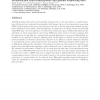Free Online Productivity Tools
i2Speak
i2Symbol
i2OCR
iTex2Img
iWeb2Print
iWeb2Shot
i2Type
iPdf2Split
iPdf2Merge
i2Bopomofo
i2Arabic
i2Style
i2Image
i2PDF
iLatex2Rtf
Sci2ools
RECOMB
2015
Springer
2015
Springer
HapTree-X: An Integrative Bayesian Framework for Haplotype Reconstruction from Transcriptome and Genome Sequencing Data
Identifying phase information is biomedically important due to the association of complex haplotype effects, such as compound heterozygosity, with disease. As recent next-generation sequencing (NGS) technologies provide more read sequences, the use of diverse sequencing datasets for haplotype phasing is now possible, allowing haplotype reconstruction of a single sequenced individual using NGS data. Previous haplotype reconstruction studies have ignored differential allele-specific expression in whole transcriptome sequencing (RNA-seq) data; however, intuition suggests that the asymmetry in this data (i.e. maternal and paternal haplotypes of a gene are differentially expressed) can be exploited to improve phasing power. In this paper, we describe a novel integrative maximum-likelihood estimation framework, HapTree-X, for efficient, scalable haplotype assembly of an individual genome using transcriptomic and genomic NGS read datasets, which makes use of differential allele-specifi...
| Added | 17 Apr 2016 |
| Updated | 17 Apr 2016 |
| Type | Journal |
| Year | 2015 |
| Where | RECOMB |
| Authors | Emily Berger, Deniz Yörükoglu, Bonnie Berger |
Comments (0)

